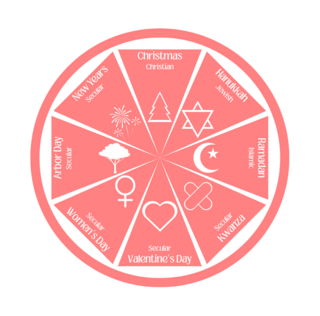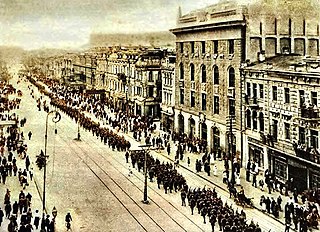
A holiday is a day or other period of time set aside for festivals or recreation. Public holidays are set by public authorities and vary by state or region. Religious holidays are set by religious organisations for their members and are often also observed as public holidays in religious majority countries. Some religious holidays, such as Christmas, have become secularised by part or all of those who observe them. In addition to secularisation, many holidays have become commercialised due to the growth of industry.

May is the fifth month of the year in the Julian and Gregorian calendars. Its length is 31 days.

Remembrance Day is a memorial day observed in Commonwealth member states since the end of the First World War to honour armed forces members who have died in the line of duty. The day is also marked by war remembrances in several other non-Commonwealth countries. In most countries, Remembrance Day is observed on 11 November to recall the end of First World War hostilities. Hostilities ended "at the 11th hour of the 11th day of the 11th month" of 1918, in accordance with the armistice signed by representatives of Germany and the Entente between 5:12 and 5:20 that morning. The First World War formally ended with the signing of the Treaty of Versailles on 28 June 1919.

Veterans Day is a federal holiday in the United States observed annually on November 11, for honoring military veterans of the United States Armed Forces. It began, and now coincides with other holidays, including Armistice Day and Remembrance Day, which are commemorated in other countries, marking the anniversary of the end of World War I. Major hostilities of World War I were formally ended at the 11th hour of the 11th day of the 11th month of 1918 when the Armistice with Germany went into effect. At the urging of major U.S. veteran organizations, Armistice Day was renamed Veterans Day in 1954.

The Great Patriotic War is a term used in Russia and some other former republics of the Soviet Union to describe the conflict fought during the period from 22 June 1941 to 9 May 1945 along the many fronts of the Eastern Front of World War II, primarily between the Soviet Union and Nazi Germany. For some legal purposes, this period may be extended to 11 May 1945 to include the end of the Prague offensive.

Victory in Europe Day is the day celebrating the formal acceptance by the Allies of World War II of Germany's unconditional surrender of its armed forces on Tuesday, 8 May 1945; it marked the official end of World War II in Europe in the Eastern Front, with the last known shots fired on 11 May.

Victory Day is a holiday that commemorates the Soviet Union victory over Nazi Germany in 1945. It was first inaugurated in the 15 republics of the Soviet Union following the signing of the German Instrument of Surrender late in the evening on 8 May 1945. The Soviet government announced the victory early on 9 May after the signing ceremony in Berlin. Although the official inauguration occurred in 1945, the holiday became a non-labor day only in 1965.
Holidays in Poland are regulated by the Non-working Days Act of 18 January 1951. The Act, as amended in 2010, currently defines thirteen public holidays.

Victory Day is a commonly used name for public holidays in various countries, where it commemorates a nation's triumph over a hostile force in a war or the liberation of a country from hostile occupation. In many cases, multiple countries may observe the same holiday, with the most prominent united celebrations occurring in states that comprised the Allies of World War II, celebrating the defeat of Nazi Germany.

The International Holocaust Remembrance Day, or the International Day in Memory of the Victims of the Holocaust, is an international memorial day on 27 January that commemorates the victims of the Holocaust, which resulted in the genocide of one third of the Jewish people, along with countless members of other minorities by Nazi Germany between 1933 and 1945, an attempt to implement its "final solution" to the Jewish question. 27 January was chosen to commemorate the date when the Auschwitz concentration camp was liberated by the Red Army in 1945.
The following are 11 public holidays in Ukraine.

The Black Ribbon Day, officially known in the European Union as the European Day of Remembrance for Victims of Stalinism and Nazism and also referred to as the Europe-wide Day of Remembrance for the victims of all totalitarian and authoritarian regimes, is an international day of remembrance for victims of totalitarianism regimes, specifically Stalinist, communist, Nazi and fascist regimes. Formally recognised by the European Union, the Organization for Security and Co-operation in Europe and some other countries, it is observed on 23 August. It symbolises the rejection of "extremism, intolerance and oppression" according to the European Union. The purpose of the Day of Remembrance is to preserve the memory of the victims of mass deportations and exterminations, while promoting democratic values to reinforce peace and stability in Europe. It is one of the two official remembrance days or observances of the European Union, alongside Europe Day. Under the name Black Ribbon Day it is an official remembrance day of Canada. The European Union has used both names alongside each other.

The Prague Declaration on European Conscience and Communism was a declaration which was initiated by the Czech government and signed on 3 June 2008 by prominent European politicians, former political prisoners and historians, among them former Czech President Václav Havel and future German President Joachim Gauck, calling for "Europe-wide condemnation of, and education about, the crimes of communism." Much of the content of the declaration reproduced demands formulated by the European People's Party in 2004, and draws heavily on the theory or conception of totalitarianism.

The Days of Remembrance of the Victims of the Holocaust (DRVH) is an annual eight-day period designated by the United States Congress for civic commemorations and special educational programs that help citizens remember and draw lessons from the Holocaust. The annual DRVH period normally begins on the Sunday before the Israeli observance of Yom HaShoah, Holocaust Memorial Day, and continues through the following Sunday, usually in April or May. A National Civic Commemoration is held in Washington, D.C., with state, city, and local ceremonies and programs held in most of the fifty states, and on U.S. military ships and stations around the world. The United States Holocaust Memorial Museum designates a theme for each year's programs, and provides materials to help support remembrance efforts.

Victory Day over Nazism in World War II was a national holiday and a non-working day in Ukraine from 2015 to 2023.

Victory Day parades are common military parades that are held on 9 May in some post-Soviet nations, primarily Russia, Kazakhstan, Belarus, and formerly Ukraine. They are usually held to honor the traditional Victory Day holiday. In 2015, the Ukrainian government renamed the holiday as "Victory Day over Nazism in World War II" as part of decommunization laws and in 2023 moved the holiday to 8 May.

The Day of Remembrance and Sorrow is a memorable date celebrated annually on 22 June in Russia, Belarus and Ukraine. It honors the anniversary of Operation Barbarossa, the Axis invasion of the Soviet Union during World War II. On 13 June. the Presidium of the Supreme Soviet of Russia declared that 22 June should be marked as the Remembrance Day for Defenders of the Fatherland. It was established by decree of President of Russia Boris Yeltsin on 8 June 1996.

The 1920 Kyiv Victory Parade was a joint Polish–Ukrainian military parade on 9 May 1920 in the Ukrainian capital of Kyiv. It was held on Khreshchatyk Street, after the city was captured from the Bolshevik Red Army by the allied forces of Poland and the Ukrainian People's Republic in the course of their Kyiv offensive. It was the first formal military parade to be held under the auspices of the Ukrainian People's Republic.

The Roma Holocaust Memorial Day is a memorial day that commemorates the victims of the Romani genocide (Porajmos), which resulted in the murder of an estimated 220,000–500,000 Romani people by Nazi Germany and its collaborators during World War II. The date of 2 August was chosen for the memorial because on the night of 2–3 August 1944, 2,897 Roma, mostly women, children and elderly people, were killed in the Gypsy family camp (Zigeunerfamilienlager) at Auschwitz concentration camp. Some countries have chosen to commemorate the genocide on different dates.

Day of Remembrance and Victory over Nazism in World War II 1939 – 1945 is a national holiday and non-working day in Ukraine established in 2023. Its first celebration was in 2024. The holiday is celebrated on May 8 and has replaced Victory Day over Nazism in World War II that was previously celebrated on May 9, from 2015 to 2023.

















